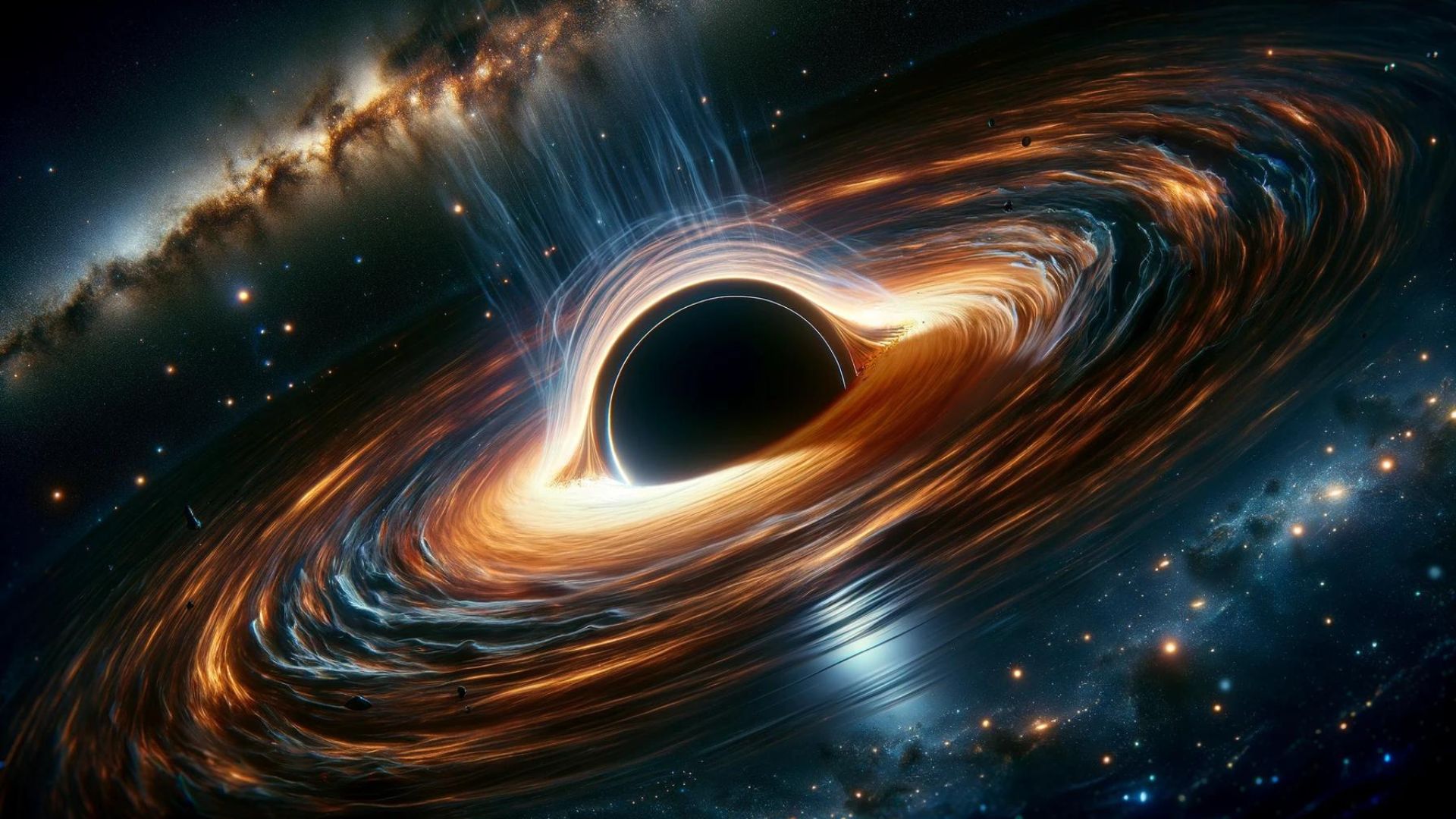What Makes a Black Hole Black?
Picture this: a cosmic vacuum cleaner with a gravitational pull so intense that absolutely nothing, not even a single ray of light, can break free. That’s the bizarre reality of a black hole. But what makes these space oddities so unfathomably dark?
To wrap your head around this, let’s talk about gravity. We’re all familiar with Earth’s gravity—it’s the reason you come back down when you jump and why apples fall from trees. Now, imagine an object with so much mass squeezed into such a tiny space that its gravity becomes insanely powerful. That’s basically a black hole in a nutshell.
This extreme gravity warps the very fabric of space and time (it gets weirder, trust me!). Think of it like a bowling ball placed on a trampoline. The ball creates a deep dent, doesn’t it? In a similar way, a black hole’s immense gravity distorts the space around it.
Now, here’s the kicker: light travels in straight lines, but around a black hole, space is so warped that light’s path is bent. There’s a point of no return called the “event horizon.” If light crosses this boundary, its path curves inward, forever trapped within the black hole’s grasp.
Why is this important? Well, we see objects because light bounces off them and reaches our eyes. With a black hole, any light that ventures too close simply disappears. With absolutely no light escaping, all we see is pure, inky blackness. Which is why they’re called “black” holes.
So, are black holes completely invisible? Not exactly! Scientists detect them by observing their effects on nearby matter. Gas and dust swirling around a black hole get superheated, emitting a ton of radiation that we can detect. It’s like seeing the cosmic leftovers of the black hole’s feast.
Your Call to Action
Mind blown? Black holes are a testament to the weird and wonderful workings of our universe. Want to dive deeper? Search online for incredible images of black holes and mind-boggling explanations of what would happen if you fell into one (spoiler alert: it’s not pretty). The cosmos is full of mysteries, and you’ve just unlocked the secret behind one of the strangest.
Why Should You Care?
- Black holes are fascinating! They challenge our understanding of physics and push the boundaries of what we think is possible.
- Unlocking cosmic mysteries: Understanding black holes helps us piece together the puzzle of how our universe works, from the formation of galaxies to the nature of gravity itself.
- Inspiring awe and wonder: The sheer strangeness of black holes reminds us that there’s so much we still don’t know, sparking curiosity and a sense of wonder about the vastness of space.
Key Takeaways
- Black holes aren’t “holes” in the traditional sense, but objects with incredibly dense mass.
- Their extreme gravity warps spacetime so much that not even light can escape past the event horizon.
- This is why they appear black – there’s no light emitted or reflected from them.
- We can still detect black holes indirectly by observing how they affect surrounding matter.
Keywords with Definitions
- Black hole: A region of space with immensely strong gravity where nothing, not even light, can escape.
- Gravity: The fundamental force of attraction between objects with mass.
- Light: Electromagnetic radiation that makes things visible.
- Spacetime: The four-dimensional fabric of our universe, combining the three dimensions of space with the dimension of time.
- Event horizon: The invisible boundary around a black hole beyond which nothing can escape.
- Mass: The amount of matter in an object.
- Density: How compact something is – its mass per unit of volume.
- Warp: To bend or distort out of shape.
- Radiation: Emission of energy in the form of waves or particles.
- Electromagnetic radiation: A type of energy that travels in waves and includes visible light, X-rays, and radio waves.
Frequently Asked Questions
- What happens if you fall into a black hole? Unfortunately, it’s a one-way trip. The extreme gravity would stretch you out like spaghetti (scientists call this “spaghettification”), and you’d be crushed as you approached the center.
- Can a black hole swallow Earth? Luckily, there aren’t any black holes close enough to pose a threat. Even if there were, they don’t “suck” things in; you’d need to get very close to be affected by its gravity.
- Do black holes lead to other universes? This is a fascinating but unproven theory that some scientists are exploring.
Myth Buster
- Myth: Black holes are giant cosmic vacuum cleaners sucking in everything.
- Reality: Black holes only exert a strong gravitational pull on objects very close to them. Their effect on distant stars and galaxies is minimal.
Let’s Talk!
- If you could ask one question about black holes, what would it be?
- Does the idea of black holes make you feel amazed, scared, or a little bit of both?
- Have you seen any cool science fiction movies or books that feature black holes?
Share your thoughts in the comments below!










0 Comments